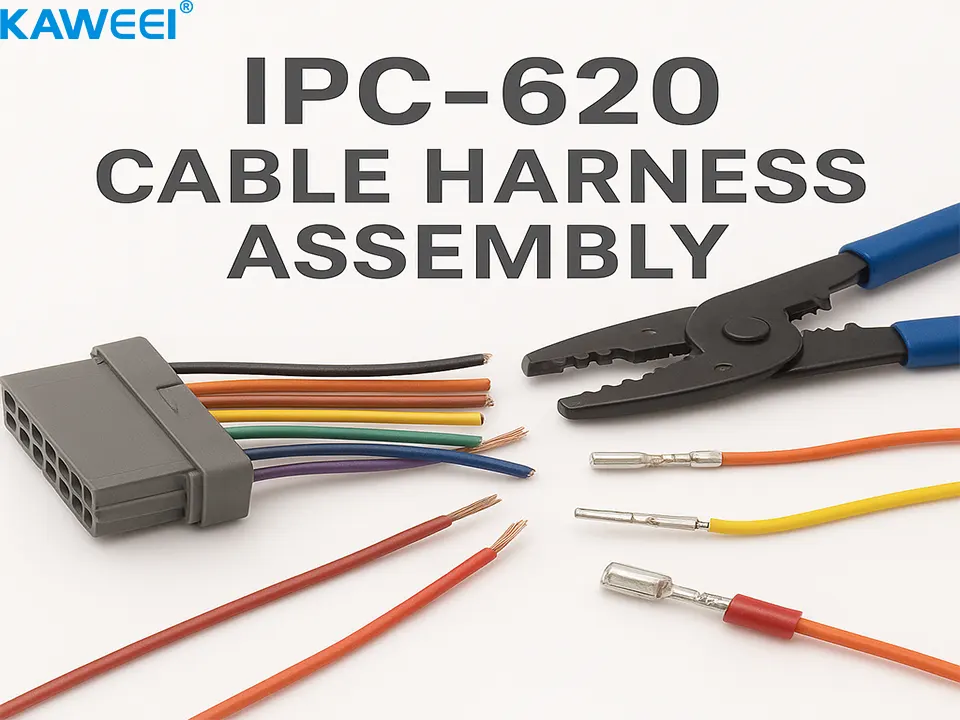Custom wire harness manufacturer following IPC 620 specifications
Key Considerations for Custom Wire Harnesses in Compliance with IPC/WHMA-A-620
IPC/WHMA-A-620 (commonly referred to as IPC 620) is the globally recognized acceptability standard for cable and wire harness assemblies, covering requirements for design, manufacturing, and inspection.

Classification Levels under IPC/WHMA-A-620
IPC 620 defines three product classes, each aligned with the application environment and reliability requirements:
Class 1 – General Electronic Products
Consumer-grade electronics where functional performance is the primary requirement, with relatively lenient environmental conditions.
Class 2 – Dedicated Service Electronic Products
Products requiring extended performance and reliability (e.g., automotive, industrial controls). Limited cosmetic and functional imperfections may be acceptable.
Class 3 – High Performance Electronic Products
Mission-critical applications (e.g., aerospace, defense, medical devices) demanding the highest reliability and strictest workmanship criteria.
Material Requirements
Wire and Cable Selection: Conductor size (AWG/mm²), insulation material, jacket, and shielding must comply with both customer specifications and industry standards.
Terminals & Connectors: Use standardized, qualified components, ensuring compatibility with conductor gauge and insulation diameter.
Drawings & BOM: Harness drawings and bill of materials should detail wire gauge, length, tolerance, color coding, connector part numbers, and termination specifications.
Technical Requirements
Cutting & Stripping: Strip length and insulation retention must meet specifications. Conductors shall remain undamaged with no nicks or broken strands. IPC 620 provides visual criteria for defects such as burrs and insulation damage.
Crimping: Crimp height, pull-out force, and crimp profile must conform to the standard. Destructive testing (crimp microsections or pull tests) is often required to validate process capability.
Soldering: For soldered terminations, IPC/WHMA-A-620 references IPC J-STD-001 workmanship requirements.
Harnessing & Protection: Routing and lacing/taping/heat-shrink application must follow the drawing. Tie-wrap spacing and shrink tubing placement must prevent over-tightening that could damage insulation.
Identification: Labels (thermal transfer, laser marking, or heat-shrink sleeves) must be legible, durable, and placed according to customer requirements.
Inspection & Testing
Visual Inspection: Evaluate workmanship against IPC 620 acceptance criteria, using defect illustrations provided in the standard.
Electrical Testing: Perform continuity, insulation resistance, and hipot (dielectric withstand) testing as required.
Functional Testing: For complex harnesses, test fit and simulate system operation prior to release.
Quality Assurance
Documentation: Maintain controlled work instructions, process sheets, and inspection records traceable to each build.
Process Control: Establish Standard Operating Procedures (SOPs) aligned with IPC 620 workmanship requirements.
Training & Certification: Ensure operators and inspectors are trained and certified to IPC/WHMA-A-620 (CIS/CIT programs).
Kaweei is a custom wire harness manufacturer committed to the IPC/WHMA-A-620 standard. We deliver reliable, high-quality assemblies for automotive, industrial, medical, and aerospace applications, ensuring compliance with Class 1, 2, and 3 requirements.
FAQ:
Q: Does Kaweei follow industry standards for wire harness manufacturing?
A:Yes, Kaweei strictly follows the IPC/WHMA-A-620 standard for wire harness and cable assembly.
Q: What industries does Kaweei serve?
A:Kaweei provides custom harness solutions for automotive, industrial, medical, and aerospace applications.
Q: How does Kaweei ensure product reliability?
A:We apply IPC-620 certified processes, strict testing, and full quality traceability for every harness.








